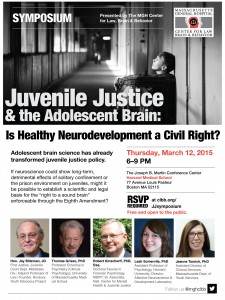
Adolescent brain science has already transformed juvenile justice policy. As we see from recent Supreme Court rulings that ended the death penalty and life without parole for juveniles, the Court is predisposed to appreciate arguments that indicate that adolescents are neurobiologically different from adults.
Brain science may also elucidate neurodevelopmental implications for juvenile offenders subject to prolonged removal from the community, facilities with limited educational and rehabilitative resources, solitary confinement, or transfer to the adult criminal system for trial and incarceration as an adult. If these conditions can be shown to have long-term, detrimental effects on the adolescent brain, might it be possible to establish a scientific and legal basis for the “right to a sound brain,” or a healthy context for brain development, enforceable through the Eighth Amendment?
On Thursday, March 12, 2015, the MGH Center for Law Brain & Behavior’s Juvenile Justice working group presented a public symposium at the Joseph B. Martin Conference Center of Harvard Medical School bringing together a juvenile court Judge (Hon. Jay Blitzman), forensic mental health evaluation and juvenile justice policy expert (Thomas Grisso), adolescent developmental neuroscientist (Leah Somerville), and Department of Youth Services clinician (Jeanne Tomich) to elucidate this question. Robert Kinscherff, forensic psychologist and Senior Associate at the National Center for Mental Health and Juvenile Justice, moderated the conversation.



